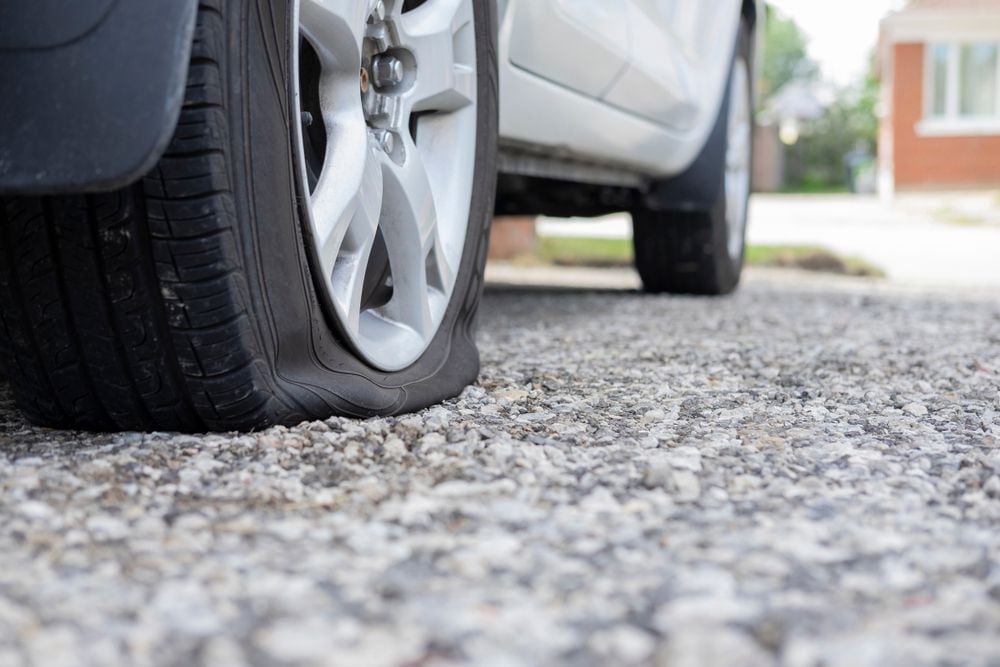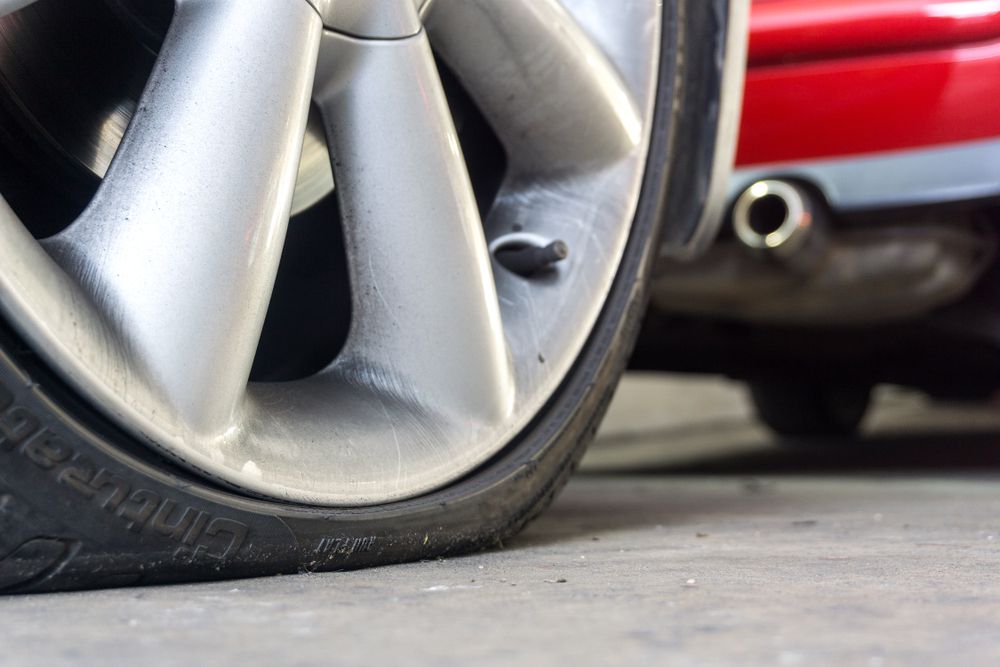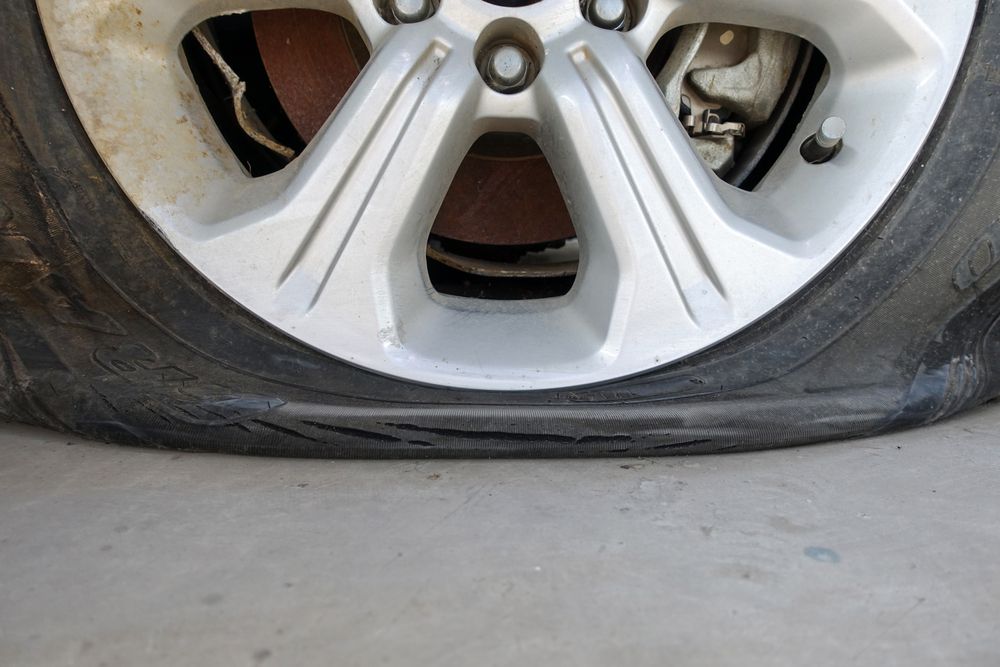
Getting a flat tire is both inconvenient and unsafe. If you suspect you
have a flat tire, confirm it as soon as possible.
A flat tire may sound like a grinding noise, a hissing noise, or a
thumping noise, depending on a few different things. Hearing noises
from your car can be alarming, and it is best to pull over to the side
of the road to assure your safety and prevent further harm to your car.
This article will tell you exactly how to identify a flat tire, what you
can do about it, and other common car issues that can be mistaken for a
flat tire.
 Flat tires can make a noise while driving.
Flat tires can make a noise while driving.
Can You Hear A Flat Tire?
A flat tire may be hard to hear if you are driving, so it is best to turn
down your radio, listen carefully, and check your car's low tire pressure
warning.
If you are standing outside your car, however, you may not be able to hear
anything, or you may hear a hissing noise.
In most cases, it should be easy to identify a flat tire from unusual car
sounds.
What Does A Flat Tire Sound Like Driving?
If you have a flat tire while driving, you may first hear a rumbling or
grinding noise and feel a vibration or bumpiness. This is because the air
in your car's tire (the rubber part) is no longer preventing the wheel (the
metal part) from touching the ground.
You may hear a thumping sound if further damage is done to the wheel and
the rim is exposed.
 Tires deflating may make a hissing sound depending on the size and type of leak.
Tires deflating may make a hissing sound depending on the size and type of leak.
What Does A Flat Tire Sound Like While Not Driving?
If you are not driving and are outside of your car, you may hear a hissing
noise if the tire is still holding some air, but sometimes, there is no
sound.
If there is no air, however, you will not be able to hear anything, but you
will be able to see the flat tire.
How Can You Tell When You Have A Flat Tire?
You can tell you have a flat tire by either hearing a grinding or thumping
noise, feeling a vibration or bumpiness, seeing a low-pressure warning on
your car, or inspecting the tire. While driving, you may also feel a pull
in the direction of the tire that is flat.
A flat tire will be further to the ground than your other tires, and the
rubber will usually be misshapen.
There may also be uneven wear on your tire tread, although this can
indicate several problems.
Can I Drive With A Slightly Flat Tire?
Driving on a slightly flat tire is possible, although it is dangerous and
could cause damage to your wheel, rims, steering system, and braking system
if more air is released from the tire.
Driving slowly, under 20 mph, is best to prevent this.
The wheel will create a cushion between the road and the tire, but driving
too fast or for too long can completely wear down the wheel, causing the
rim to be exposed and damaged and the wheel to be unrepairable.
If your tire is still holding air, you may be able to drive to your nearest
gas station to fill up on air, but you will need a tire pressure gauge.
Driving On A Completely Flat Tire
If your tire does not hold any air and there are no other options, you
can't call for help or change your spare tire; you may be able to drive
between 5 and 10 mph to a stopping point.
Your wheel will be destroyed, but the rim should be fine. Replacing a wheel
is a lot cheaper than replacing a whole tire, so if you have no other
options, it is best if you only have to replace a new wheel.
How Do You Tell If A Tire Is Flat Or Just Needs Air?
You can tell the difference between a flat tire and one that needs air by
how quickly the tire has lost air.
Normally, a flat tire loses air rapidly and needs to be fixed before it can
hold air again. A flat tire will also be noticeably misshapen compared to
the other wheels.
A fake flat tire sound can easily cause worry, but this is not always the
cause of abnormalities. When your tire is flat, you will hear an
unmistakable flapping sound.
A tire that just needs air usually loses air pressure over months or years
and won't become flat again for some time when filled.
It is beneficial to keep a tire pressure gauge in your car that you can use
to check the low air pressure in your tires in case you're ever unsure.
 Tire blowouts will make a noise in most cases.
Tire blowouts will make a noise in most cases.
Can You Hear A Popped Tire?
It will be almost impossible not to hear a popped tire. Popping a tire
causes a very loud boom, and you will feel and hear the flat tire right
after it pops.
You will also feel a pull on your steering wheel toward the popped tire.
It is essential to pull over and have the tire replaced before driving any
further, as you can cause damage to your car by driving on a popped tire.
Why Does My Car Sound Like It Has A Flat Tire But Doesn't?
There are a few common causes of a flat tire-like sound.
If you inspect your car to find no flat tire, this doesn't mean you should
keep driving. On the contrary, further inspection is needed to keep you and
your car safe.
Your car may have bad wheel bearings, which make the same grinding sound as
a flat tire. In addition, the tires on your vehicle could be damaged or
misaligned, which can cause a pull in one direction of your car. The tire
belt could also be broken, which can cause shaking while driving.
How Do I Know If I Have A Tire Or Wheel Bearing Noise?
There is almost no difference between a flat tire and a wheel-bearing
noise. Therefore, the best way to check which problem you have is by first
inspecting the tire. If there is damage to the tire, this is most likely
the noise culprit.
You will have to jack up the car to check, but you can ensure it is the
tire and not the wheel bearing by spinning it while it is off the ground
and checking if the noise location has changed.
You most likely have a bad wheel bearing if you hear a grinding noise while
spinning the tire.
If you suspect you have a bad tire or wheel bearing, it is best to go to an
auto body shop where a mechanic can repair and replace any issues with your
car.
How Do I Tell The Difference Between Misaligned Wheels And A Flat Tire?
Just like with a flat tire, misaligned wheels can cause a pull in one
direction of your car.
However, unlike a flat tire, there will not be a noticeable bumpiness, but
there can be shaking in the whole car.
There can also be a screeching sound caused by the wheels trying to go in
different directions.
Conclusion
Flat tires are very easy to diagnose. Even if the sound is similar to
another common car issue, a simple inspection of your tires using your
ears, eyes, and a tire pressure gauge should tell you whether you have a
flat tire.
Maintain your vehicle at an auto repair shop regularly to confirm tire
pressure is normal and everything is in good condition.
Regardless of your car's problem, it is important to get it fixed as soon
as possible to ensure less damage to your car and the complete safety of
you and your passengers.